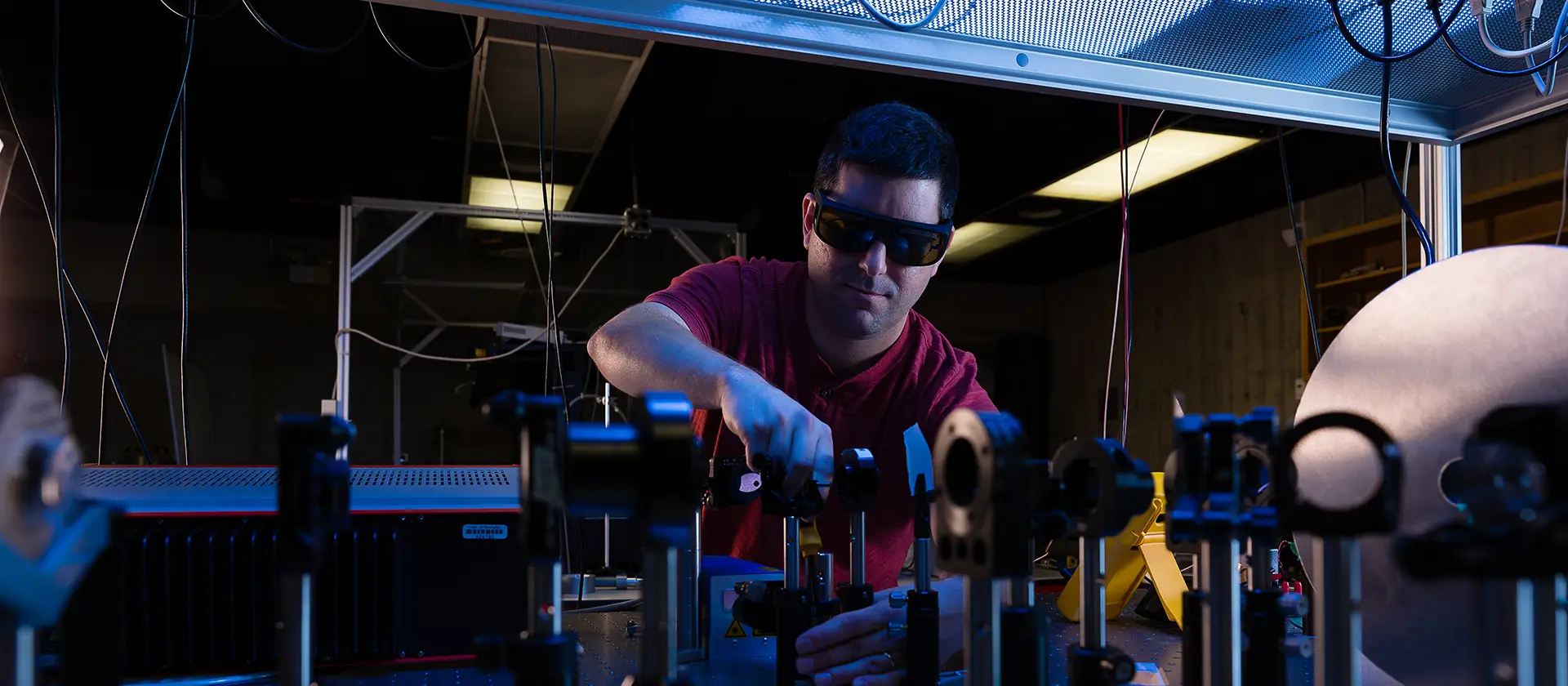
“I like everything about the physics department. The professors are incredibly talented, friendly, and helpful with advice for those trying to figure out what to do after graduation. As well, undergraduate students have many opportunities to do research.”
– Allison Kolly, BSc (Honours), MSc in Atmospheric & Oceanic Sciences (McGill University), CancerCare Manitoba Researcher
Physics
Physics is crucial to understanding the world around us, the world inside us, and the world beyond us. Physics challenges our imaginations and leads to great discoveries that, in turn, bring life-changing technologies.
Science begins with Physics. Physics encompasses the study of the universe from the largest galaxies to the smallest (subatomic!) particles. Physics challenges our imaginations and leads to great discoveries. Physicists also work to solve some of the greatest challenges of our times by finding ways to cure cancer, heal joints, or develop solutions for sustainable energy (www.aps.org/careers/advice/why-study-physics).
UWinnipeg has an internationally recognized Physics Department, which offers an excellent learning atmosphere, fostered by small class sizes and individual attention from professors, with the unique opportunity to perform cutting edge research as an undergrad. The curriculum combines foundational theoretical and experimental/hands-on lab instruction with new cutting-edge topical courses, such as physical computing, quantum computing, and medical imaging.
Our professors’ research spans a broad range of topics – from digital agriculture and robotics to subatomic physics (especially neutron and neutrino particles) and material science to the use of magnetic resonance imaging (MRI) in diagnosing disease, to the inner workings of black holes, higher-dimensional cosmology, superstrings, and quantum gravity. Students often participate in these research activities, and find paid employment with the various research groups.
UWinnipeg offers a 3-year or 4-year Bachelor of Science degree in a variety of specialized streams: Pre-Engineering, Honours, Applied Physics, Chemical Physics, Computational Physics, Medical Physics, and Mathematical Physics. Physics can be used as a teachable subject in our Education program. Also see related programs: “Pre-Engineering”, “Medical Physics”, and “Computational Physics."
Required High School Courses
In addition to meeting The University of Winnipeg’s general admission requirements, you must have Physics 40S and Pre-Calculus Mathematics 40S. However, some courses do not require these prerequisites, such as Introductory Physics, Astronomy, Cosmology, Scientific Computing.

Ready to Apply?
Get StartedQuestions about the application process? Contact a student recruitment officer at welcome@uwinnipeg.ca or 204.786.9844.
“I like everything about the physics department. The professors are incredibly talented, friendly, and helpful with advice for those trying to figure out what to do after graduation. As well, undergraduate students have many opportunities to do research.”
– Allison Kolly, BSc (Honours), MSc in Atmospheric & Oceanic Sciences (McGill University), CancerCare Manitoba Researcher
Program Contacts
Dr. Jeff Martin, Chair
phone: 204.786.9443
email: j.martin@uwinnipeg.ca
Visit Physics department website
In any case where The University of Winnipeg Academic Calendar and this webpage differ, the current Calendar takes precedence.
How to Apply
For details on application requirements and deadlines, and to apply online, please visit: uwinnipeg.ca/apply
For more information contact a student recruitment officer at welcome@uwinnipeg.ca or 204.786.9844.

Program Contacts
Dr. Jeff Martin, Chair
phone: 204.786.9443
email: j.martin@uwinnipeg.ca
web: uwinnipeg.ca/physics
In any case where The University of Winnipeg Academic Calendar and this fact sheet differ, the current Calendar takes precedence.
Last Updated: 07/10/2025
“I like everything about the physics department. The professors are incredibly talented, friendly, and helpful with advice for those trying to figure out what to do after graduation. As well, undergraduate students have many opportunities to do research.”
– Allison Kolly, BSc (Honours), MSc in Atmospheric & Oceanic Sciences (McGill University), CancerCare Manitoba Researcher
Last Updated: 07/10/2025

